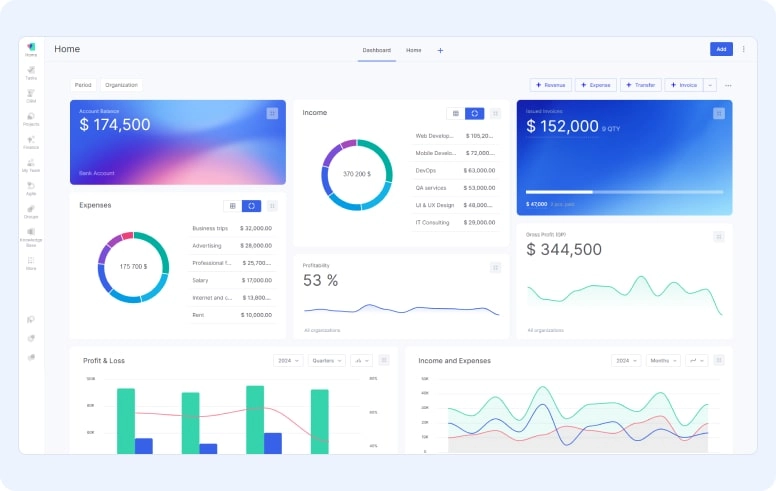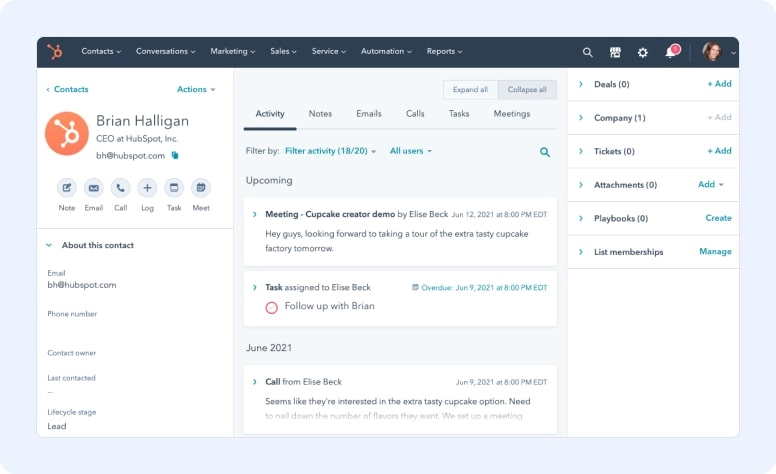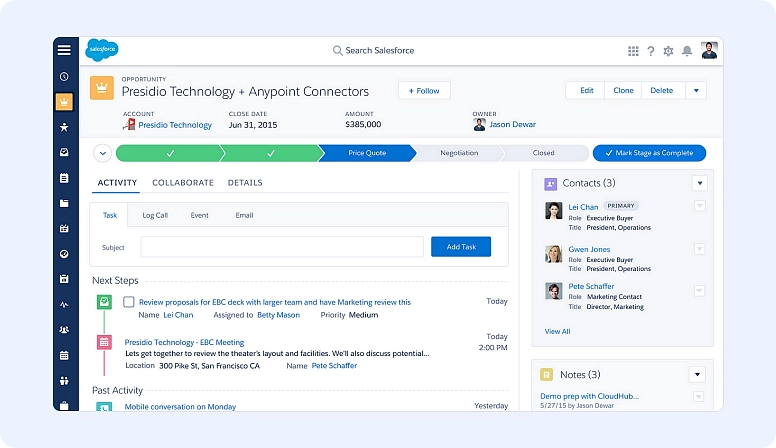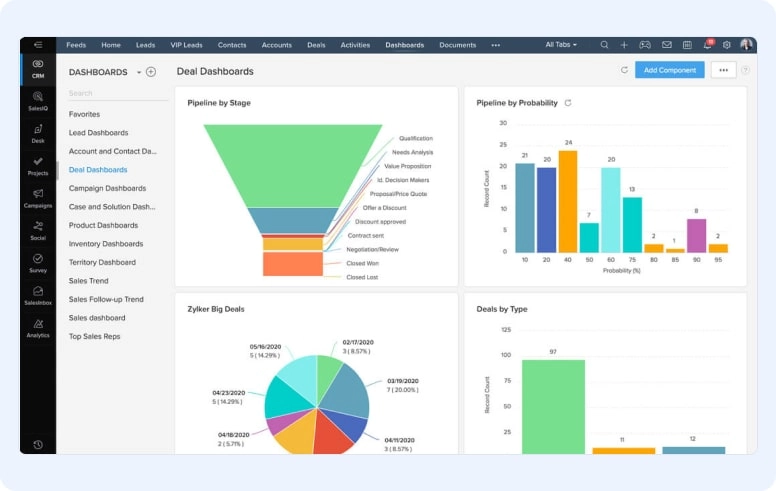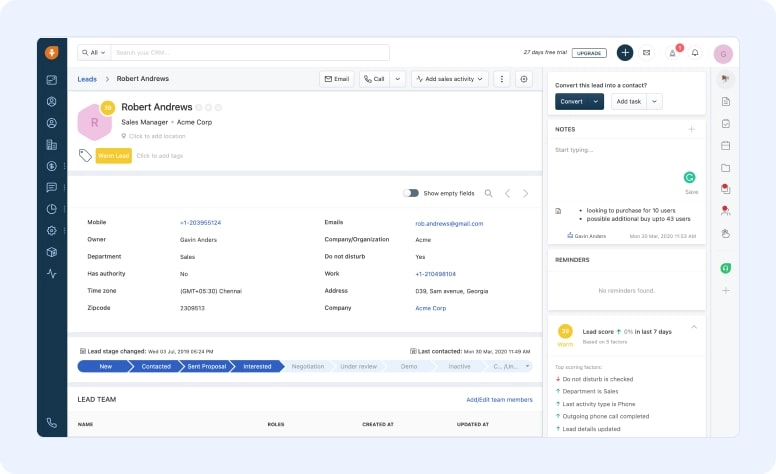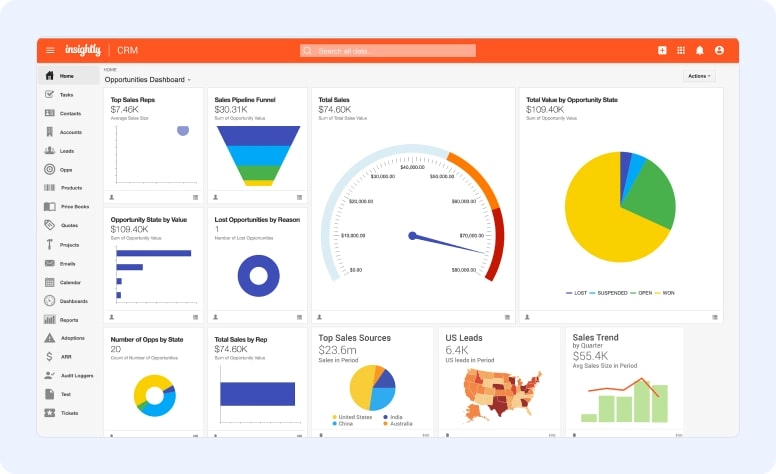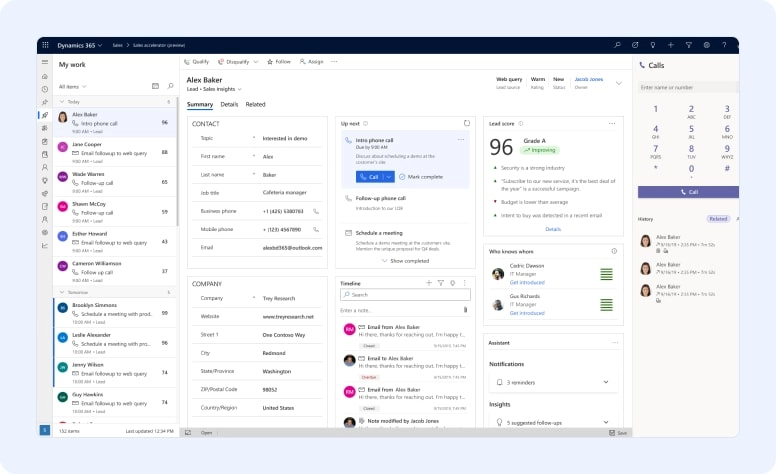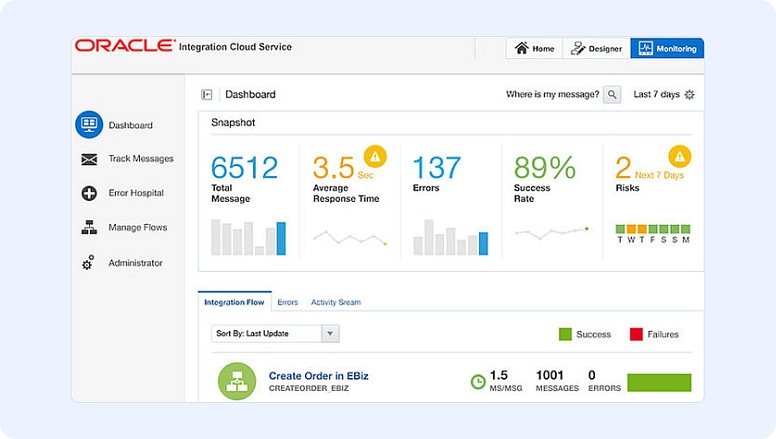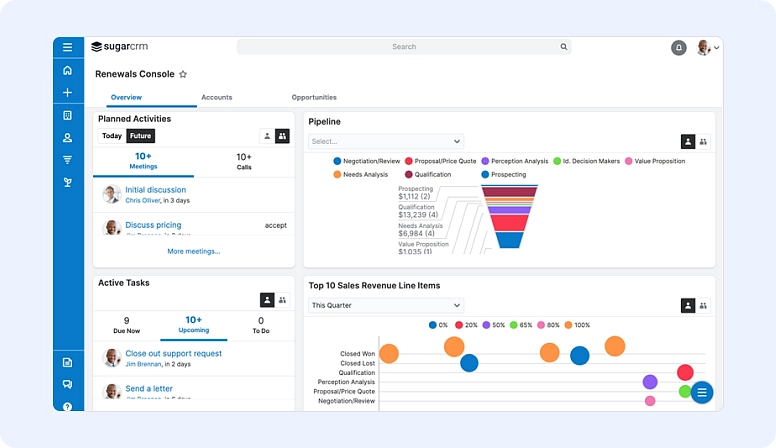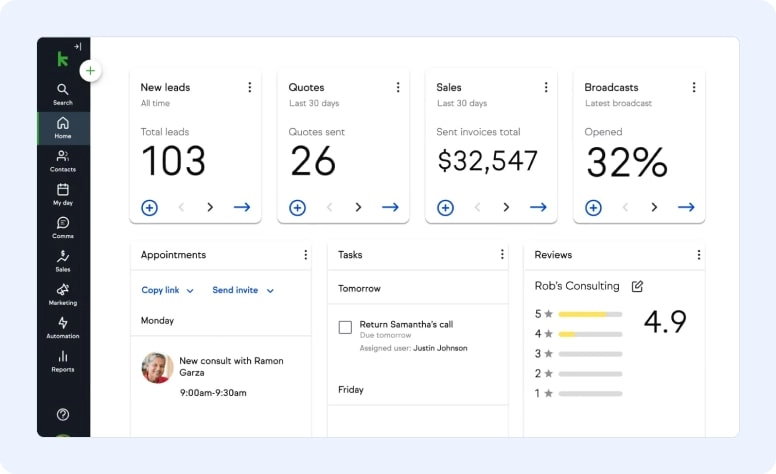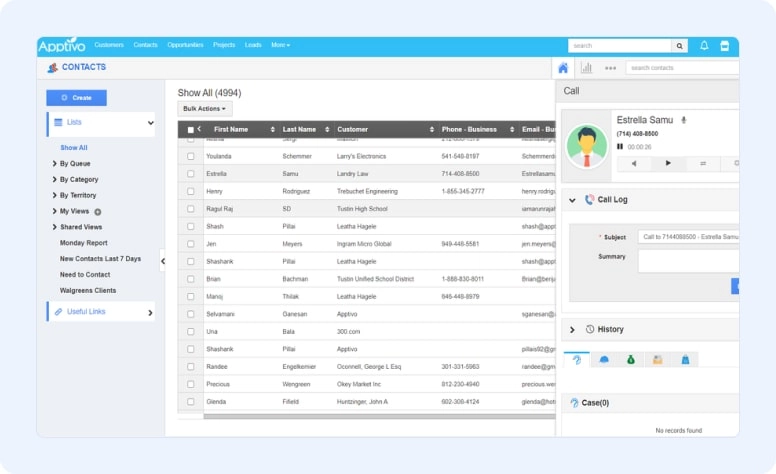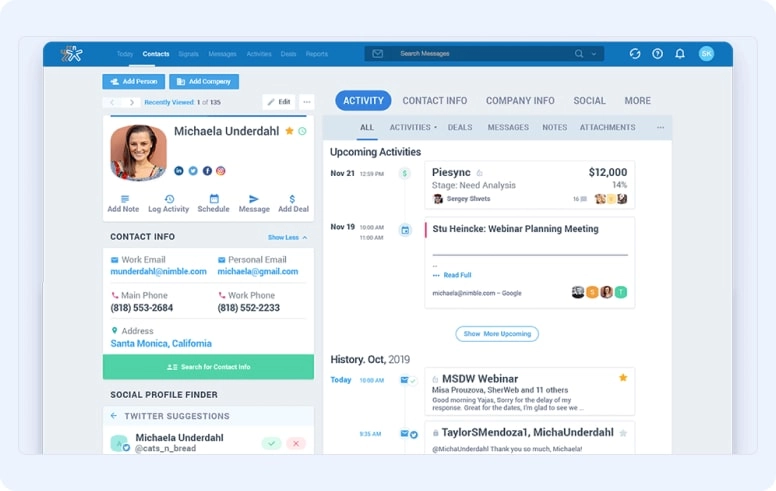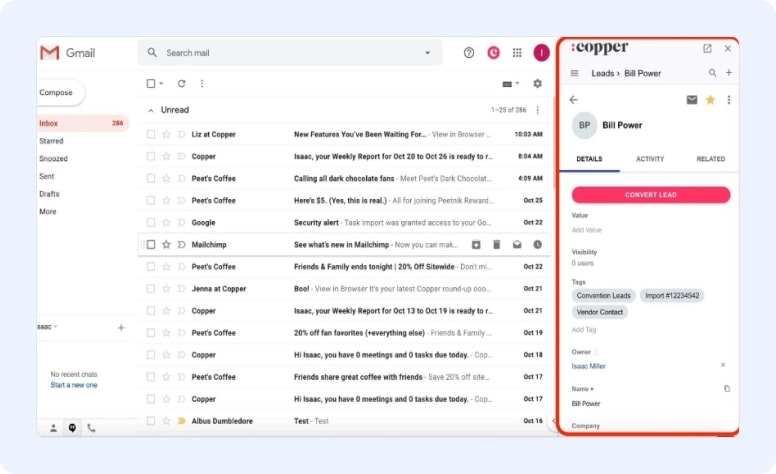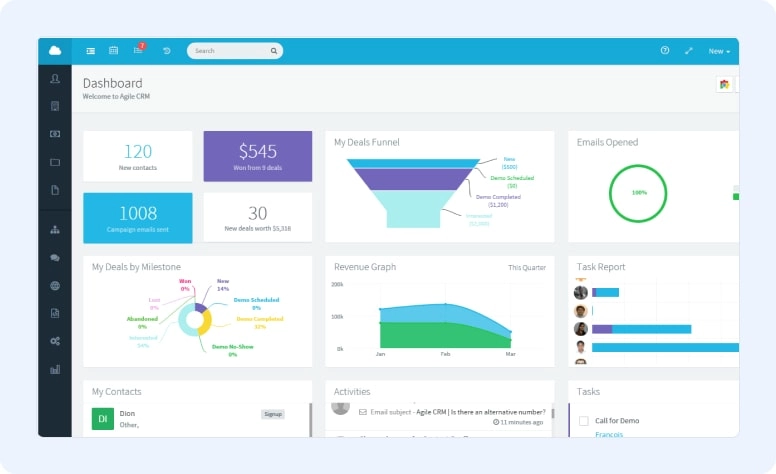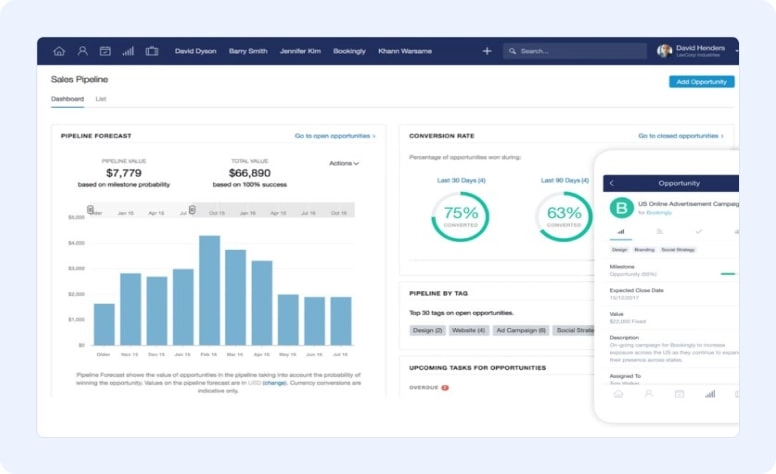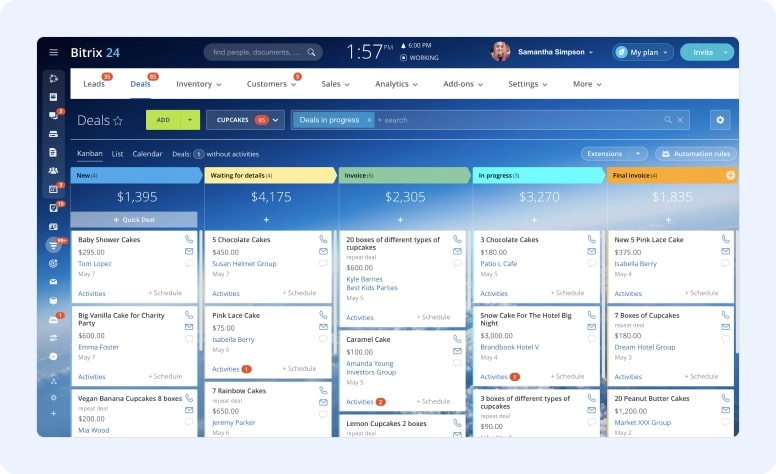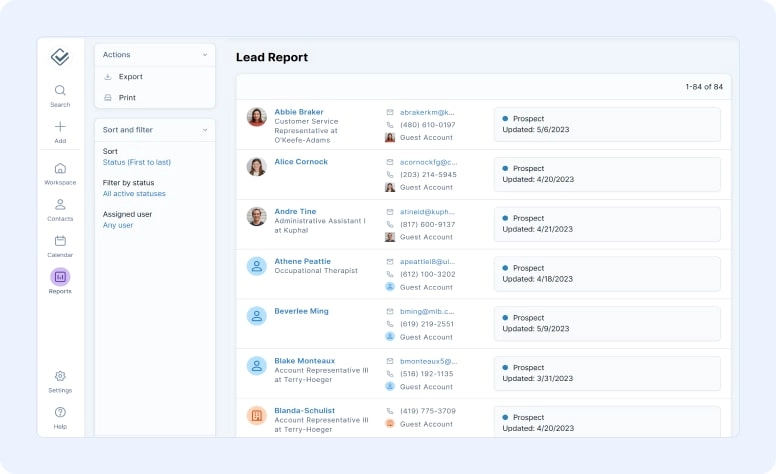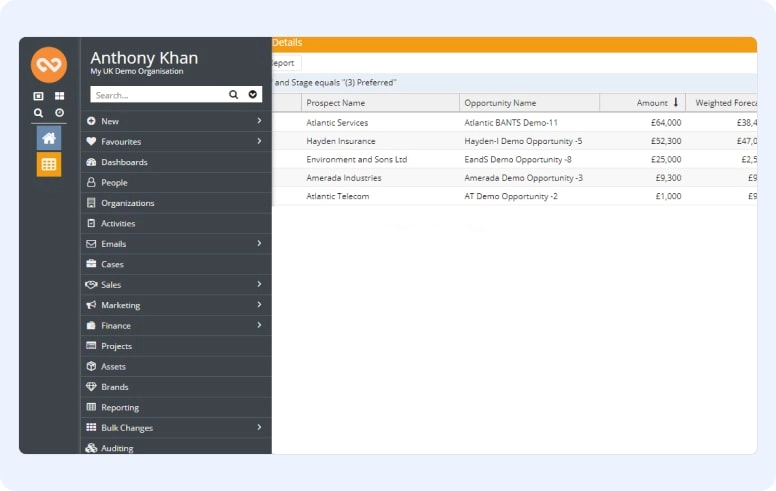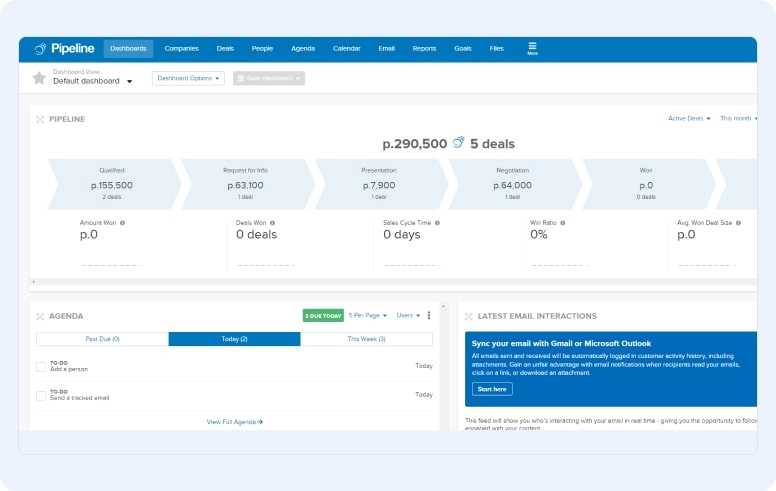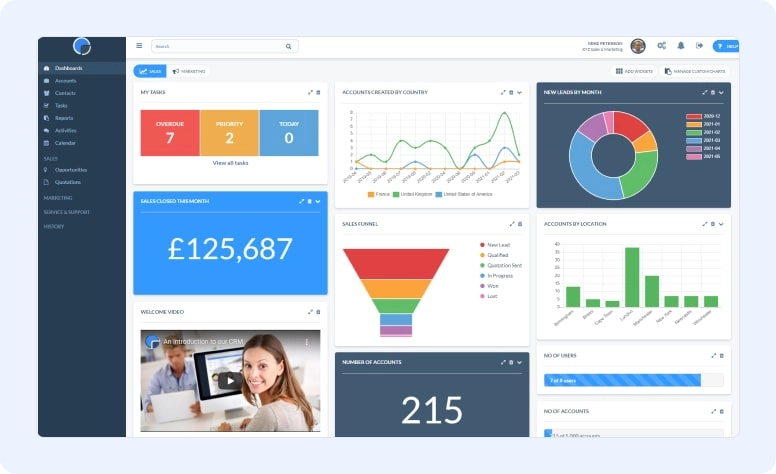Top 20 Alternatives to Pipedrive for Modern Sales Teams
- Key Features of Pipedrive
- Why Look for Pipedrive CRM Alternatives?
- #1: Flowlu
- #2: HubSpot
- #3: Salesforce
- #4: Zoho CRM
- #5: Freshsales
- #6: Insightly
- #7: Microsoft Dynamics 365
- #8: Oracle CRM
- #9: SugarCRM
- #10: Keap
- #11: Apptivo
- #12: Nimble
- #13: Copper
- #14: Agile CRM
- #15: Capsule CRM
- #16: Bitrix24
- #17: Less Annoying CRM
- #18: Workbooks CRM
- #19: Pipeline CRM
- #20: Spotler CRM
- Recap of Pipedrive Competitors
- Final Thoughts
Pipedrive is a widely recognized Customer Relationship Management tool, lauded for its simplicity and efficiency. Developed with a salesperson's needs in mind, it focuses on streamlining the sales process and increasing overall productivity. This cloud-based solution offers a range of features tailored to small to medium-sized businesses, making it a popular choice among startups and growing companies.
Key Features of Pipedrive
- Sales Pipeline Management: Users can easily visualize their sales processes, track progress, and identify bottlenecks.
- Email Integration and Tracking: Pipedrive allows users to send and receive emails directly within the platform.
- Mobile App: Pipedrive provides flexibility and accessibility for sales professionals on the go.
- Lead and Deal Management: The platform enables efficient management of leads and deals, allowing users to track the journey of a potential customer from initial contact to final sale.
- Integration with Other Tools: Pipedrive supports integrations with a wide array of third-party applications.
Why Look for Pipedrive CRM Alternatives?
When it comes to selecting a CRM system, businesses often gravitate towards popular CRM like Pipedrive. However, there are several compelling reasons why a company might seek better alternatives to Pipedrive:
- Diverse Business Needs: Every business is unique, with specific requirements and challenges. While Pipedrive excels in certain areas, it might not cater to the unique needs of every business, especially when it comes to industry-specific functionalities or advanced customization options.
- Scalability Concerns: As businesses grow, their needs evolve. Pipedrive, designed predominantly for small to medium-sized businesses, may not scale as effectively for bigger enterprises or rapidly expanding companies.
- Feature Limitations: Some businesses might find Pipedrive’s feature set limiting, especially if they are looking for advanced features like extensive automation, AI-driven insights, or deep analytics that Pipedrive doesn't fully support.
- Budget Constraints: Pricing is a crucial factor for many businesses. Companies might be looking for cheaper solutions or different pricing structures that align better with their financial strategies.
- Integration Requirements: While Pipedrive offers a range of integrations, some businesses might require more extensive or specific third-party integration capabilities that Pipedrive cannot fully accommodate.
- User Experience and Interface: User experience is subjective. Some teams might prefer a different interface or find another system more intuitive and aligned with their workflow.
- Customer Support and Resources: The level and quality of customer support can significantly impact the user experience. Businesses might search for analogues that offer more comprehensive, responsive, or specialized support.
- Seeking Comprehensive Solutions: Some companies might be in search of more comprehensive solutions that offer CRM as part of a larger suite of business tools, such as integrated project management and sales platforms, which Pipedrive does not provide.
- Market Trends and Innovations: Staying abreast of new technologies and trends is vital in today's fast-paced business environment. Companies might explore alternatives to benefit from the latest innovations in CRM software that are not present in Pipedrive.
The decision to seek a CRM similar to Pipedrive is driven by a variety of factors, ranging from business size and growth to the need for specific features and integrations. It's important for businesses to assess their unique requirements and explore different options to find a CRM solution that aligns perfectly with their objectives and growth trajectory.
Let’s explore the best alternatives to Pipedrive, considering various factors like pricing, features, and user experience.
#1: Flowlu
Flowlu offers a different approach to customer relationship management and business operations. It is an all-in-one business management software that provides tools not only for CRM but also for project management, finance, time tracking, and collaboration. It aims to deliver a comprehensive platform for businesses to manage all aspects of their operations, from sales and customer interactions to project execution and financial tracking. It's designed to cater to businesses of all sizes.
Key Features:
- CRM Capabilities: Flowlu offers a full suite of CRM tools, including lead and opportunity management, customer data organization, and sales funnel visualization, which makes it one of the best Pipedrive CRM alternatives for sales management.
- Project Management: It includes extensive project management tools, such as task assignments, time tracking, and project workflows.
- Financial Management: Flowlu provides invoicing and estimating, forecasting, payment and expense tracking, and financial reporting features.
- Team Collaboration: Features like team chat, knowledge bases, mind maps and collaborative workspaces are available.
- Automation: The platform allows for automation of repetitive tasks and processes with its powerful automation rules.
- Customizable Dashboards: Users can tailor dashboards to their specific needs, allowing them to monitor the financial metrics that matter most to their business.
Pros:
- Comprehensive Suite: Flowlu’s all-in-one approach is beneficial for businesses looking for a single platform to manage various aspects of their operations.
- User-Friendly Interface: Users generally find the software intuitive and easy to navigate.
- Customization and Flexibility: Flowlu offers a high level of customization, allowing businesses to tailor the platform to their specific needs.
- Integration Capabilities: It integrates with various third-party applications, enhancing its functionality.
- Affordable Pricing: Compared to other comprehensive solutions, Flowlu is very affordable, making it accessible for small to medium-sized businesses.
Cons:
- Learning Curve: Due to its extensive features, new users may experience a steep learning curve.
- Limited Mobile App Functionality: The mobile app might not offer the full range of features available on the desktop version.
Flowlu is a versatile alternative to Pipedrive, especially for businesses seeking an all-in-one solution for CRM, project management, and financial tools.
#2: HubSpot
Hubspot is much more than a CRM; it's a complete sales, marketing, and service platform. Its CRM component is free, but its true power lies in the integration with the HubSpot Sales, Marketing, and Service Hubs.
Key Features:
- Free CRM: Ideal for small businesses or startups.
- Lead Management: Tracks interactions automatically and organizes contacts in a detailed database.
- Marketing Integration: Seamlessly integrates with the HubSpot marketing suite for inbound marketing strategies.
Pros:
- An all-inclusive set of tools for sales, marketing, and client support.
- User-friendly interface with minimal learning curve.
- Excellent for companies focusing on inbound marketing strategies.
Cons:
- The free version has limited features, and the paid versions can be pricey.
- May be overwhelming for businesses looking for just a CRM solution.
#3: Salesforce
Salesforce is a heavyweight in the CRM industry, known for its scalability and extensive customization options.
Key Features:
- Sales Cloud: Offers a comprehensive view of customers, including activity history, key contacts, customer communications, and internal account discussions.
- Customization: Highly customizable to fit various business needs.
- AppExchange: An extensive marketplace of third-party applications.
Pros:
- Highly scalable, suitable for businesses of all sizes.
- Rich in features with extensive customization options.
- Strong analytics and reporting capabilities.
Cons:
- Can be complex and overwhelming for smaller businesses or beginners.
- Relatively expensive compared to other options.
#4: Zoho CRM
Zoho CRM is known for its affordability and is an excellent option for small to medium-sized businesses.
Key Features:
- Sales Automation: Streamlines your sales process.
- Multichannel Support: Supports email, live chat, phone, and social media.
- Analytics: Provides detailed reports and analytics.
Pros:
- Affordable with a straightforward pricing structure.
- Easy to use with a clean interface.
- Good integration with other Zoho products and third-party applications.
Cons:
- The free version offers a restricted range of functionalities.
- Some users report issues with customer support.
#5: Freshsales
Freshsales by Freshworks is a dynamic and user-friendly CRM platform, particularly appealing to businesses that prioritize lead management.
Key Features:
- AI-based Lead Scoring: Identifies promising leads.
- Email Tracking: Provides information on email open rates and click-throughs.
- Sales Pipeline Management: Customizable pipelines for different sales processes.
Pros:
- Intuitive interface with minimal setup required.
- AI-based insights provide a competitive edge.
- Comprehensive mobile app for on-the-go management.
Cons:
- Limited third-party integrations compared to other platforms.
- The free version has restricted features.
#6: Insightly
Insightly combines CRM and project management, offering a unique blend of functionalities.
Key Features:
- Project Management: Manages post-sale processes.
- Relationship Linking: Allows linking of contacts, organizations, and opportunities.
- Custom Reports: Facilitates creation of custom reports and dashboards.
Pros:
- Integrates CRM with project management.
- Good for tracking customer interactions and project progress.
- User-friendly interface.
Cons:
- Limited functionality in the lower-priced tiers.
- Some users report occasional glitches and slow performance.
#7: Microsoft Dynamics 365
A part of Microsoft's suite of business applications, Dynamics 365 CRM is known for its integration with other Microsoft products and services.
Key Features:
- Seamless integration with Microsoft Office 365.
- Advanced AI insights and custom reporting.
- Strong automation capabilities.
Pros:
- Highly customizable and scalable.
- Strong data security features.
- Extensive customer support.
Cons:
- Can be complicated to set up and use.
- Higher cost than some other CRM solutions.
#8: Oracle CRM
Oracle CRM, part of Oracle Cloud, is designed for medium to large enterprises, offering a comprehensive suite of applications.
Key Features:
- Robust cloud-based infrastructure.
- Extensive customer data management.
- Advanced analytics and forecasting tools.
Pros:
- Scalable for large organizations.
- High degree of customization.
- Strong integration capabilities.
Cons:
- Complex, not ideal for small businesses.
- Can be expensive.
#9: SugarCRM
SugarCRM is recognized for its adaptability and tailorability as an open-source customer relationship management platform.
Key Features:
- High level of customization.
- Comprehensive sales, marketing, and service automation.
- Advanced reporting and analytics.
Pros:
- Flexible and open-source platform.
- Good customer support.
- Suitable for businesses of all sizes.
Cons:
- Requires technical expertise for setup and customization.
- Additional costs for premium features.
#10: Keap
Keap (formerly Infusionsoft) is tailored for small businesses, focusing on automation and streamlining customer interactions.
Key Features:
- Sales and marketing automation.
- E-commerce tools.
- Client management and communication.
Pros:
- Intuitive and user-friendly interface.
- Strong automation capabilities.
- Good for small businesses and solopreneurs.
Cons:
- Limited scalability for larger businesses.
- Some users report a steep learning curve.
#11: Apptivo
Apptivo is a cloud-based CRM that offers a suite of integrated business management applications.
Key Features:
- Customizable apps for various business functions.
- Integrated invoicing and billing.
- Contact and opportunity management.
Pros:
- Affordable and scalable.
- Wide range of integrated business tools.
- User-friendly interface.
Cons:
- May lack depth in certain specific features.
- Integration with external tools can be limited.
#12: Nimble
Nimble is a simple and straightforward CRM, particularly strong in social media integration.
Key Features:
- Contact management with social media integration.
- Unified communication inbox.
- Sales and marketing automation.
Pros:
- Strong social media features.
- Easy to use and set up.
- Affordable pricing.
Cons:
- Limited advanced features.
- Not ideal for larger businesses.
#13: Copper
Copper CRM (formerly ProsperWorks) is known for its integration with Google Workspace (G Suite), targeting small to medium-sized businesses.
Key Features:
- Integration with Google Workspace.
- Automated data entry and task management.
- Visual pipeline management.
Pros:
- Seamless integration with Google services.
- Intuitive and easy to use.
- Good for small and medium-sized businesses.
Cons:
- Limited customization options.
- Relatively basic reporting tools.
#14: Agile CRM
Agile CRM combines sales, marketing, and service in one platform, aimed at small to medium-sized businesses.
Key Features:
- Contact and lead management.
- Marketing automation tools.
- Helpdesk and ticketing.
Pros:
- All-in-one CRM solution.
- User-friendly and affordable.
- Good range of features for SMEs.
Cons:
- Some limitations in scalability and customization.
- Users report occasional glitches.
#15: Capsule CRM
Capsule focuses on simplicity and ease of use, offering an intuitive CRM platform for small businesses.
Key Features:
- Contact management and sales pipeline.
- Task and activity tracking.
- Customizable sales milestones.
Pros:
- Straightforward and easy to use.
- Affordable for small businesses.
- Good basic feature set.
Cons:
- Limited advanced features.
- Not ideal for larger businesses.
#16: Bitrix24
Bitrix24 is a comprehensive CRM solution that offers a wide range of features. One of the unique aspects of Bitrix24 is its emphasis on collaboration, providing a suite of tools to enhance teamwork and internal communication.
Key Features:
- Task and sales management.
- Marketing tools.
- Telephony, email, and chat integrations.
Pros:
- Sales intelligence and automation.
- Free tier available.
- High degree of customization.
Cons:
- Complex interface, steep learning curve.
- Limited customization in lower tiers.
- Users report slow response times.
#17: Less Annoying CRM
The goal of Less Annoying CRM is to streamline customer management tasks without overwhelming users with excessive features or a steep learning curve.
Key Features:
- Contact management.
- Lead tracking and pipeline management.
- Calendar and tasks.
Pros:
- Simplicity and ease of use.
- Customization flexibility.
- Exceptional customer service.
Cons:
- No dedicated mobile apps.
- Basic reporting tools.
#18: Workbooks CRM
Workbooks CRM balances advanced features with usability, aiming to offer a solution that can grow and adapt with a business.
Key Features:
- Sales force automation.
- Marketing automation.
- CRM reporting and analytics.
Pros:
- Reasonable pricing.
- Intuitive dashboard and reporting.
- Good customer service.
Cons:
- Range of integrations is limited.
- API limitations.
#19: Pipeline CRM
Pipeline CRM is a suitable option for businesses looking for an effective, no-frills solution to manage their sales pipeline and customer relationships.
Key Features:
- Pipeline and sales activity management.
- Sales forecasting.
- Activity-based selling.
Pros:
- User-friendly interface.
- High levels of customization.
- Mobile accessibility.
Cons:
- No free plan.
- Phone assistance is only available in the Enterprise package.
#20: Spotler CRM
Spotler CRM (formerly: Really Simple Systems) is software specialized in tools for B2B marketing teams, providing everything marketers require to run their sales and marketing tasks in one system.
Key Features:
- Email marketing tools.
- Lead management.
- Campaign tracking.
Pros:
- Ease of use.
- Cost-effectiveness.
- Good customer support.
Cons:
- Lack of mobile apps.
- Customization limitations.
Recap of Pipedrive Competitors
In this exploration of paid and free Pipedrive alternatives, we've uncovered a diverse landscape of CRM solutions, each with unique strengths and offerings. Pipedrive has established itself as a user-friendly, efficient tool for sales pipeline management, but the CRM market is rich with alternatives catering to various business needs.
Flowlu, with its comprehensive feature set and advanced CRM capabilities, stands as a robust option for businesses seeking to centralize all their operations in one single portal. HubSpot, blending CRM with marketing and sales tools, is ideal for those prioritizing inbound marketing strategies. Zoho CRM appeals to smaller businesses for its affordability and adaptability, while Freshsales brings AI-driven insights to the forefront. Microsoft Dynamics 365 integrates CRM with ERP solutions, making it a compelling choice for businesses deeply embedded in the Microsoft ecosystem.
For small businesses, alternatives like Insightly and Agile CRM offer simplicity and affordability, presenting viable options for those just starting with CRM software. On the other end of the spectrum, Oracle CRM caters to large enterprises with their advanced features and customization capabilities.
As the CRM market continues to evolve, staying informed about the latest trends and advancements is crucial. The future of CRM lies in further integration with AI, machine learning, and automation, enhancing efficiency and predictive capabilities.
In choosing the right CRM, it's essential to align the software's features with your business's specific needs, size, and industry. User-friendliness, customization, integration capabilities, and cost should all be considered to ensure that your chosen CRM software not only meets your current requirements but also supports your business's growth and evolution.
Final Thoughts
While Pipedrive remains a popular CRM choice, its alternatives like Flowlu offer diverse options catering to different business needs. Flowlu stands out with its all-in-one approach, combining CRM with project management and communication tools. It's particularly well-suited for businesses looking for a comprehensive platform to handle multiple aspects of their operations.
When exploring alternatives to Pipedrive, one may not find a direct clone, but there's a comprehensive list of CRM programs that cater to various needs and platforms. Unlike Pipedrive, some alternatives offer distinct features tailored for specific operating systems like Mac, Android, and Windows. This diversity allows users to choose a CRM tool that aligns seamlessly with their existing tech ecosystem.
While Pipedrive operates primarily online, several of its competitors provide offline functionalities, a boon for businesses needing access in areas with limited internet connectivity. These CRM solutions are not just confined to downloadable programs; there are sites and web-based platforms that offer robust CRM services directly from a browser, ensuring flexibility and accessibility.
Each type of CRM tool, whether it's a website or a dedicated application, comes with unique features and integrations. This variety ensures that businesses, regardless of their size or industry, can find a CRM solution that fits their specific requirements, offering a level of customization and functionality that goes beyond what Pipedrive offers.
Yes, there are free CRM solutions like Flowlu that offer basic functionalities suitable for startups and small businesses.
Switching CRMs can be complex, depending on the data and processes involved. It's essential to plan and prepare for a smooth transition.
When searching for paid or free alternatives to Pipedrive, it's essential to consider several key features that can impact your customer relationship management efficiency. Firstly, look for robust sales pipeline management capabilities, which allow you to track and manage sales processes effectively. Secondly, ensure the replacement offers detailed analytics and reporting tools. These tools help in making data-driven decisions and understanding customer interactions better. Lastly, choose a CRM with strong integration capabilities, enabling seamless connection with other tools and platforms used in your business.
- Sales Pipeline Management: Essential for tracking and managing sales processes.
- Analytics and Reporting Tools: Crucial for data-driven decision-making and understanding customer interactions.
- Integration Capabilities: Important for seamless connection with other business tools and platforms.
Almost every CRM solution offers features similar to Pipedrive, except for a few unique alternatives that provide innovative functionalities setting them apart in the competitive market.
Flowlu offers a broader range of project tracking and opportunity management features, whereas Pipedrive focuses more on sales pipeline management.









